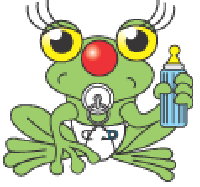Sudden Infant Death Syndrome

On 28th June 2002 Red Nose Day will once again take place to raise money for the continued research and awareness into Sudden Infant Death Syndrome (SIDS). An annual national event, Red Nose Day originated in Britain in March 1988 and the first Australian Red Nose Day was held in September 1988 and raised around $1.3 million. The Red Nose Day Campaign has proven to be very successful in its use of a red nose to symbolise a serious issue whilst still providing a sense of fun.
Red Nose Day has been established to achieve the following:
So what exactly is SIDS?
Sudden Infant Death Syndrome (SIDS) or 'cot death' was originally defined in 1969 and is the term given to the unexpected death of a baby where there is no apparent cause of death. In Australia, SIDS is the major cause of death in children between the ages of one month and one year. SIDS is more common in babies between the ages of two to four months but can occur in younger and older babies too. Research has shown that of those that die, 60 per cent are boys.
As it stands, approximately 250 babies die from SIDS each year. But due to ongoing research and changes in childcare practices, the incidence of SIDS in Australia is on the decline and has halved in numbers. In 1990, the number of babies that died from SIDS was 500.
The changed forms of childcare practices include:
The risk of SIDS is increased if an unborn child is exposed to smoking during pregnancy. The same risk applies to a child after birth.
One of the most frustrating and difficult aspects about cot death is that the real cause of SIDS remains unknown. There is often speculation that SIDS is a result of choking, parental neglect or accidental smothering, but none of these theories have been proven. Because of the lack of consistent warning signs, it is hard and virtually impossible to detect whether a baby is in danger of SIDS. These sudden deaths can occur at any time of the day but are more prevalent in babies sleeping at night.
For more information on SIDS or Red Nose Day visit
www.sidsandkids.org
www.rednoseday.com.au
- Annemarie Failla
Red Nose Day has been established to achieve the following:
- raising money for research into SIDS and other causes of infant mortality
- funding the planning, producing and implementation of programs such as SIDS and Kids Sleeping Baby Safely program
- increasing public awareness and understanding of bereavement issues for parents and others affected by the sudden and unexpected death of an infant or young child
- raising public awareness of the work of SIDS organisations
So what exactly is SIDS?
Sudden Infant Death Syndrome (SIDS) or 'cot death' was originally defined in 1969 and is the term given to the unexpected death of a baby where there is no apparent cause of death. In Australia, SIDS is the major cause of death in children between the ages of one month and one year. SIDS is more common in babies between the ages of two to four months but can occur in younger and older babies too. Research has shown that of those that die, 60 per cent are boys.
As it stands, approximately 250 babies die from SIDS each year. But due to ongoing research and changes in childcare practices, the incidence of SIDS in Australia is on the decline and has halved in numbers. In 1990, the number of babies that died from SIDS was 500.
The changed forms of childcare practices include:
- Putting the baby to sleep on their back.
- The risk of SIDS is increased if a baby sleeps on their stomach.
- Ensuring the baby's head is uncovered during sleep.
- Avoid using soft bedding like quilts, doonas or pillows and tuck in the baby's bedclothes securely. Also remove soft toys from a baby's cot.
- Keeping the baby in a smoke-free environment before and after birth.
The risk of SIDS is increased if an unborn child is exposed to smoking during pregnancy. The same risk applies to a child after birth.
One of the most frustrating and difficult aspects about cot death is that the real cause of SIDS remains unknown. There is often speculation that SIDS is a result of choking, parental neglect or accidental smothering, but none of these theories have been proven. Because of the lack of consistent warning signs, it is hard and virtually impossible to detect whether a baby is in danger of SIDS. These sudden deaths can occur at any time of the day but are more prevalent in babies sleeping at night.
For more information on SIDS or Red Nose Day visit
www.sidsandkids.org
www.rednoseday.com.au
- Annemarie Failla
MORE



